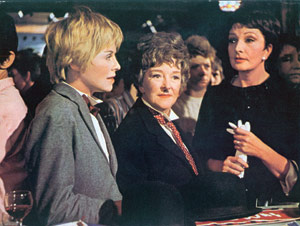“The story of three consenting adults in the privacy of their own home” is how posters for Robert Aldrich’s The Killing of Sister George described the lurid lesbian melodrama upon its initial theatrical release.
| The Killing of Sister George | |
|---|---|

Original film poster
|
|
In the theater, Frank Marcus’ 1964 play was done as a dark, satirical a comedy, but on the big screen, it became a noirish melodrama, especially manifest in the last, graphic seduction scene. (Public showings of the film had often deleted that scene).
A year after the smash hit of WWII “The Dirty Dozen,” Aldrich took this controversial drama, casting Beryl Reid, who had scored on stage, as a popular soap opera star named June. Sister George, a beloved character in the radio series Applehurst, is a nurse who ministers to the medical needs and personal problems of the local villagers.
In her private life, June Buckridgean is a gin-guzzling cigar-chomping alcoholic lesbian—a butchd yke–who lives with her much younger lover, Alice “Childie” McNaught (Susannah York), a sweetly naïve but not very bright girl. Their relationship has elements of S&M, including both verbal and occasionally physical abuse.
When the vindictive TV executive Mercy Croft (Coral Browne) takes a liking to Alice, she arranges to have June’s character, Sister George, killed off the show. Drunk and paranoid, June struggles to keep it together but in the end loses Alice. In one of their many arguments, the arrogant (but insecure) June charges at Childie: “Since what you know about poetry wouldn’t cover one tile in a public lavatory, it’s reasonable to suppose that Mrs. Mercy Bloody Croft’s overpowering interest in you is other than poetic.”
There are other memorable lines, which account for why the picture has become a cult gay and camp item. Consider this exchange. When Childie says, “Not all girls are bloody raving lesbians,” the witty and aggressive June retorts quickly, “That is a misfortune that I am perfectly well aware of.”
Because of its risque, taboo subject of lesbianism, “The Killing of Sister George” was slapped with X-rating, which was a kiss of death at the box-office.
The 1964 London theatrical production starred Beryl Reid as June Buckridge, who reprised the role on Broadway, before playing it on the big screen and winning a Golden Globe nomination for it.
Credits
DVD: August 23, 2005
Directed, produced by Robert Aldrich
Written by Lukas Heller based on Frank Marcus play
Music by Gerald Fried
Cinematography Joseph F. Biroc
Edited by Michael Luciano
Production companies: Palomar Pictures, The Associates and Aldrich
Distributed by Cinerama Releasing Corporation
Release date: December 12, 1968
Running time: 138 minutes
Language English
Budget $2,55 million
Box office $5,32 million













